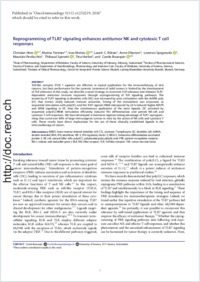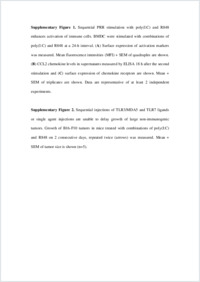Reprogramming of TLR7 signaling enhances antitumor NK and cytotoxic T cell responses
- Hotz, Christian Chair of Pharmacology, Department of Medicine, Faculty of Science, University of Fribourg, Switzerland
- Treinies, Marina Chair of Pharmacology, Department of Medicine, Faculty of Science, University of Fribourg, Switzerland
- Mottas, Inès Chair of Pharmacology, Department of Medicine, Faculty of Science, University of Fribourg, Switzerland - Section of Pharmaceutical Sciences, Faculty of Science, and Department of Anesthesiology, Pharmacology and Intensive Care, Faculty of Medicine, University of Geneva, Switzerland
- Rötzer, Laurin C. Division of Clinical Pharmacology, Center for Integrated Protein Science Munich, Ludwig-Maximilian-University Munich, Germany
- Oberson, Anne Chair of Pharmacology, Department of Medicine, Faculty of Science, University of Fribourg, Switzerland
- Spagnuolo, Lorenzo Chair of Pharmacology, Department of Medicine, Faculty of Science, University of Fribourg, Switzerland
- Perdicchio, Maurizio Chair of Pharmacology, Department of Medicine, Faculty of Science, University of Fribourg, Switzerland
- Spinetti, Thibaud Chair of Pharmacology, Department of Medicine, Faculty of Science, University of Fribourg, Switzerland
- Herbst, Tina Chair of Pharmacology, Department of Medicine, Faculty of Science, University of Fribourg, Switzerland
- Bourquin, Carole Chair of Pharmacology, Department of Medicine, Faculty of Science, University of Fribourg, Switzerland - Section of Pharmaceutical Sciences, Faculty of Science, and Department of Anesthesiology, Pharmacology and Intensive Care, Faculty of Medicine, University of Geneva, Switzerland
-
01.11.2016
Published in:
- OncoImmunology. - 2016, vol. 5, no. 11, p. e1232219
English
Toll-like receptor (TLR) 7 agonists are effective in topical application for the immunotherapy of skin cancers, but their performance for the systemic treatment of solid tumors is limited by the development of TLR tolerance. In this study, we describe a novel strategy to overcome TLR tolerance and enhance TLR7-dependent antitumor immune responses through reprogramming of TLR signaling pathways. The sensitivity of TLR7 signaling in dendritic cells (DC) was increased by prior stimulation with the dsRNA poly(I:C) that mimics virally induced immune activation. Timing of the stimulations was important, as sequential stimulation with poly(I:C) and the TLR7 agonist R848 interspaced by 24 h induced higher MAPK and NFkB signaling in DC than the simultaneous application of the same ligands. DC activated by sequential poly(I:C)/R848 stimulation efficiently induced Th1 differentiation and primed NK-cell and cytotoxic T-cell responses. We have developed a treatment regimen taking advantage of TLR7 reprogram-ming that cured over 80% of large immunogenic tumors in mice by the action of NK cells and cytotoxic T cells. These results have direct implications for the use of these clinically established ligands in the immunotherapy of cancer.
- Faculty
- Faculté des sciences et de médecine
- Department
- Département de Médecine
- Language
-
- English
- Classification
- Biological sciences
- License
-
License undefined
- Identifiers
-
- RERO DOC 278635
- DOI 10.1080/2162402X.2016.1232219
- Persistent URL
- https://folia.unifr.ch/unifr/documents/305438
Other files
Statistics
Document views: 107
File downloads:
- pdf: 207
- Supplementary material: 112

